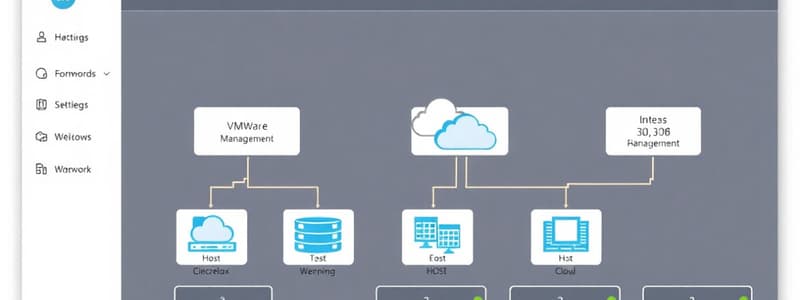Podcast
Questions and Answers
What is the primary function of vCenter Server in VM management?
What is the primary function of vCenter Server in VM management?
- Running applications directly on the host
- Creating physical servers
- Managing virtual machines and their resources (correct)
- Monitoring internet connectivity
VCenter Server can only monitor VM performance, not host health.
VCenter Server can only monitor VM performance, not host health.
False (B)
What are two tasks you can perform to manage host resources in vCenter?
What are two tasks you can perform to manage host resources in vCenter?
Monitor CPU and memory usage; update VMware ESXi hosts with patches.
The _______ feature in vCenter allows for automatic resource allocation within a cluster.
The _______ feature in vCenter allows for automatic resource allocation within a cluster.
Match the following vCenter features with their functions:
Match the following vCenter features with their functions:
Which type of issues can you troubleshoot using vCenter logging and monitoring?
Which type of issues can you troubleshoot using vCenter logging and monitoring?
Storage management in vCenter only involves monitoring storage performance.
Storage management in vCenter only involves monitoring storage performance.
What is the purpose of resource allocation optimization in vCenter?
What is the purpose of resource allocation optimization in vCenter?
Flashcards
Power On/Off VMs
Power On/Off VMs
Start or stop a VM. It's the equivalent of turning on or off a physical computer.
VM Console
VM Console
A remote access interface allowing you to interact with a VM as if you were directly at the machine.
Host Health
Host Health
The overall status of the physical server running VMs.
Cluster Utilization
Cluster Utilization
Signup and view all the flashcards
Storage Performance
Storage Performance
Signup and view all the flashcards
Network Connectivity
Network Connectivity
Signup and view all the flashcards
Resource Allocation
Resource Allocation
Signup and view all the flashcards
Backup and Recovery
Backup and Recovery
Signup and view all the flashcards
Study Notes
Day 2 Operations within VMware vCenter
-
Log In and Navigation: Access vCenter Server using credentials. Navigate vCenter Server interface, inventories (hosts, VMs, clusters).
-
VM Management:
- Power on/off VMs.
- Suspend/Resume/Restart VMs.
- Access VM console (e.g., remote desktop).
- Manage VM configuration (CPU, memory, disk space).
- Monitor VM performance (CPU, memory, disk I/O).
-
Host Management:
- Monitor host health (CPU, memory, storage, network).
- Update VMware ESXi hosts with available patches.
- Configure and manage host resources (CPU, memory).
- Observe and address host-related alerts.
-
Cluster Management:
- Monitor cluster performance.
- Understand cluster utilization metrics.
- Control cluster-wide resource allocation (e.g., CPU, memory).
- Handle HA/DRS events.
-
Storage Management:
- Confirm storage availability for VMs.
- Monitor storage performance.
- Troubleshoot storage issues affecting VMs.
- Troubleshoot storage performance bottlenecks.
- Manage storage capacity.
-
Network Management:
- Configure/manage network settings for vSphere VMs/hosts.
- Troubleshoot network connectivity (VMs to external networks).
- Check VM network performance.
- Assign network interfaces.
-
Resource Allocation:
- Optimize resource allocation via performance metrics.
- Adjust resources based on workloads.
- Balance workloads across clusters/hosts.
- Monitor resource pool usage.
-
Security:
- Enforce security policies (hosts, VMs, data).
- Use vCenter security for user access/authentication.
- Address security vulnerabilities and apply patches.
- Implement access control lists.
-
Backup and Recovery:
- Implement/administer VM backups using vCenter solutions.
- Validate backups.
- Understand restoration processes.
- Establish recovery procedures for failures.
-
Troubleshooting:
- Utilize vCenter logs/monitoring for VM/host issues.
- Identify/resolve performance bottlenecks.
- Employ effective troubleshooting tactics.
- Interpret error messages, alerts, and logs.
-
Monitoring and Reporting:
- Use vCenter tools for performance monitoring.
- Generate reports from performance data.
- Analyze data from logs.
- Analyze CPU, memory, and storage utilization.
-
Performance Tuning:
- Address performance issues for VMs/hosts.
- Optimize settings for optimal VM performance.
- Fine-tune resource parameters.
- Diagnose performance issues to find root causes.
-
vSphere APIs:
- Automate day-2 tasks (deployment, config, resource allocation) with vSphere APIs.
- Automate and schedule tasks.
- Use scripting for routine administrative tasks.
Studying That Suits You
Use AI to generate personalized quizzes and flashcards to suit your learning preferences.



